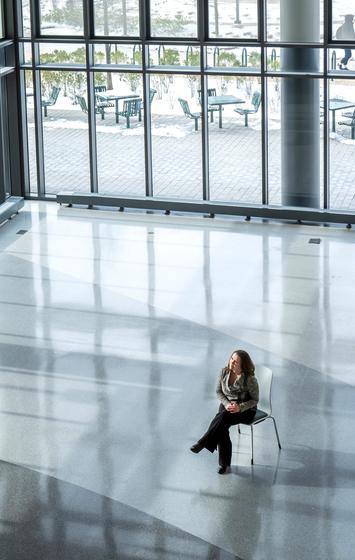Rachel Wernicke
Job: Associate Dean and Chief Mental Health Officer, University Life
Rachel Wernicke has worked as an Army officer, psychologist, therapist, and coach. In 2019, she moved into her current role: associate dean and chief mental health officer at George Mason University.

At that time, University Life at Mason created the role of chief mental health officer to address student mental health from a more strategic, public health approach. This decision happened at a critical moment, just before the world entered the greatest mental health challenge of a generation: a global pandemic.
A group effort: “We continue to see significant need for mental health support in students, faculty, and staff,” Wernicke said. “Supporting mental health takes a whole campus effort, with the engagement of our entire Mason community and a commitment to creating a culture and providing the programs and services that sustain mental health and well-being.”
According to Wernicke, nearly every role on campus is connected to this work, “even if on the surface it may not seem so,” she said.
Supporting the troops: Wernicke’s time as an Army captain influenced her decision to become a psychologist. “A core Army leadership practice focuses on caring for people,” Wernicke said. “Learning how to do this when I served as an Army officer led me to study psychology and become a therapist.” The leadership lessons she learned in the Army continue to shape her leadership style today.
Passion for education: As a therapist in training, Wernicke had the opportunity to work in college mental health, and she loved working with students. “Although I’ve practiced in hospitals and other settings, I kept returning to higher education over the years,” Wernicke said.

Mental health as the second pandemic: The COVID-19 pandemic brought increased attention to the need for expanded mental health care. As a result, Mason has adapted and expanded its mental health services for students.
Answering the call: The number of students seeking mental health services is rising, both at Mason and nationally, continuing a trend that was underway before the pandemic. From 2010 to 2020, the total number of students served by Mason’s CAPS increased by 55%. The growing demand for services hasn’t stopped.
“As of January 2024, just over halfway through our fiscal year, CAPS has supported more than 1,100 students,” Wernicke said. “This compares to 1,254 students served during the entirety of the previous fiscal year.”
Multiple avenues for care: SHS also provides mental health care to students. “SHS provides universal screening for depression and substance use concerns to all students being seen by a health care provider,” Wernicke said. “Any student who screens positive for these concerns is offered treatment.”
In the 2023 fiscal year, SHS had 725 behavioral health interactions with students, a 266% increase from the prior year.
Mason launched a partnership with a telemental health vendor, TimelyCare, in fall 2022. This care option reaches students wherever they are located, at whatever time is convenient for them. Through TimelyCare, students may access free mental health services 24/7, 365 days a year. As of January 2024, TimelyCare has provided mental health services to 1,518 Mason students since its launch.
Planning for the future: Mason continues to evolve its approach to supporting mental health. Wernicke serves as cochair of Mason’s Mental Health and Well-Being Task Force with Nance Lucas, executive director of Mason’s Center for the Advancement of Well-Being.
The task force includes students, faculty, and staff from across the university. “The charge is both aspirational and practical, focusing on creating a systems approach to mental health and well-being at Mason,” Wernicke said.
Putting ideas into action: This year, their goals are to identify a Mason model of mental health and well-being, recommend ways that well-being and mental health services can be expanded, enhance the inclusiveness of these programs and services, and increase community awareness of what is already available. The Patriots Thriving Together hub has been created as a starting point for Mason students and employees to find resources.
Finding joy: Practicing what she preaches, Wernicke finds ways to support her own well-being. “I have three kids—they’re in college, high school, and middle school—so keeping up with their activities and staying connected with them is a priority,” Wernicke said. “Music is a major source of well-being for me and something I enjoy with my family.” She also finds joy and relaxation by exercising, running, spending time with friends, and cooking.
Support from all around: Wernicke says she thrives at Mason because of the people around her. “I’m lucky to be able to work with some of the most talented and committed clinicians, educators, and advocates in CAPS, SHS, and Disability Services,” Wernicke said. “I appreciate being able to work with people from across the university who are committed to student health and well-being.”
Mental health and well-being resources at Mason:
- Patriots Thriving Together
- Counseling and Psychological Services: 703-993-2380
- Student Support and Advocacy Center (SSAC): SSAC Support Request
- Crisis Text Line: Text HOME to 741741 to reach a crisis counselor
- TimelyCare
- Mason's Center for Community Mental Health
Watch Wernicke’s Tedx Talk, “Mental Health in the New Normal: Shaping Our COVID Stories,” for more insights about the pandemic’s impact on mental health and well-being.
Meet more of the Mason Nation
- March 12, 2025
- February 28, 2025
- November 22, 2024
- October 11, 2024
- June 19, 2024
